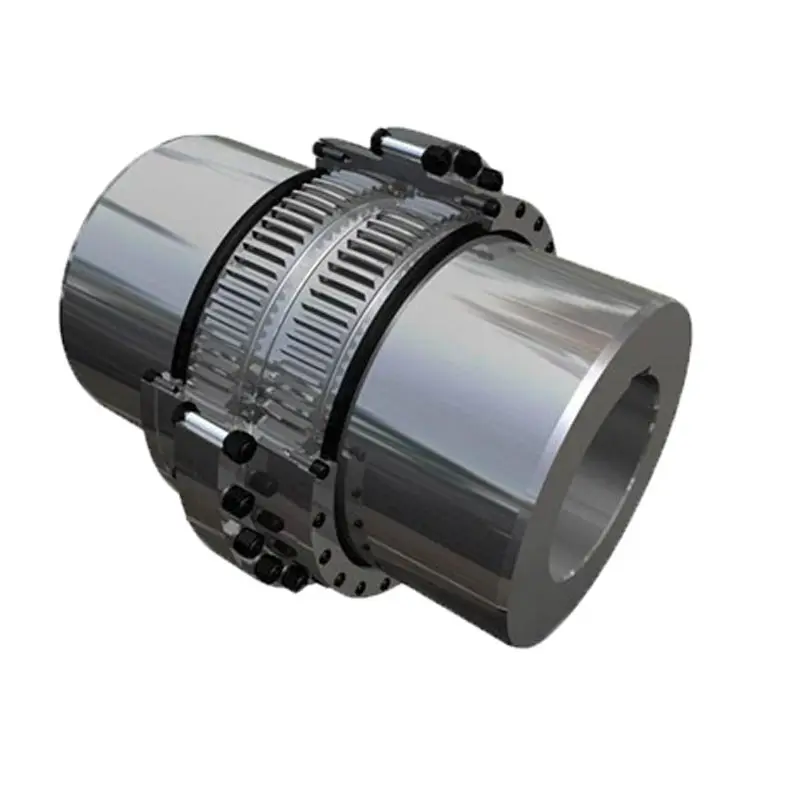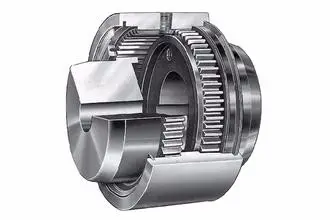Product Description
High Quality Steel Tooth Flexible Rubber Plastic Falk Flexible Nylon Sleeve Universal Joints Chainbox Muff Gear Coupling Replacement of Bowex Coupling
A gear coupling is a type of mechanical coupling that is used to connect 2 shafts at their ends to transmit torque and rotational motion. It consists of 2 hubs with external teeth connected by a flexible element, typically a sleeve or a disk, with internal teeth.
The hubs are usually made of steel or other high-strength materials, and the teeth are cut using precision machining techniques to ensure proper fit and alignment. The flexible element is designed to compensate for any misalignment between the 2 shafts and to allow for a slight amount of angular and axial misalignment during operation.
Gear couplings are commonly used in heavy-duty applications, such as in large machinery and industrial equipment, where high torque and precision are required. They are also used in applications where shafts are subjected to significant amounts of vibration and shock, such as in marine and aerospace applications.
One of the advantages of gear couplings is that they are highly efficient at transmitting torque, with very little energy loss. They are also durable and require minimal maintenance, making them popular in many industries.

Maintenance Requirements for Flexible Gear Couplings
To extend the lifespan and ensure optimal performance of flexible gear couplings, regular maintenance is essential. Here are the key maintenance requirements:
- Lubrication: Proper lubrication is crucial for flexible gear couplings. Regularly inspect the coupling’s lubrication system and ensure it is filled with the recommended lubricant. Adequate lubrication reduces friction, wear, and heat generation, leading to smoother operation and increased lifespan.
- Inspection: Regularly inspect the flexible gear coupling for signs of wear, damage, or misalignment. Look for unusual vibrations, noise, or temperature increases during operation, as these may indicate issues that need attention.
- Torque Monitoring: Periodically check the torque levels to ensure they are within the coupling’s specified limits. Overloading the coupling can lead to premature wear and failure.
- Bolt Tightening: Check and tighten the coupling bolts as needed. Vibrations and continuous operation can cause bolts to loosen over time, affecting the coupling’s performance.
- Alignment: If misalignment is detected during inspection, address it promptly. Proper shaft alignment is crucial for the coupling’s longevity and smooth operation.
- Environmental Considerations: Be mindful of the operating environment. In harsh conditions, such as corrosive or high-temperature environments, additional protective measures may be necessary to safeguard the coupling’s integrity.
Following these maintenance practices will help prevent premature wear, reduce downtime, and extend the lifespan of flexible gear couplings, ensuring reliable and efficient power transmission in the long run.

Handling Torsional Stiffness and Dynamic Balancing in Flexible Gear Couplings
Flexible gear couplings are designed to effectively handle torsional stiffness and dynamic balancing in rotating machinery. Here’s how they achieve this:
- Torsional Stiffness: Flexible gear couplings are engineered to provide a certain level of torsional stiffness while still allowing for some flexibility. This stiffness helps transmit torque efficiently from one shaft to another, ensuring minimal power loss. The flexibility of the coupling allows it to accommodate misalignments and shock loads, reducing the risk of damage to connected equipment.
- Dynamic Balancing: Proper dynamic balancing is crucial in rotating machinery to prevent vibrations that could lead to premature wear and damage. Flexible gear couplings are designed to have symmetrical and evenly distributed masses. This helps minimize any dynamic imbalances that could occur during rotation, resulting in smoother and more stable operation.
The combination of torsional stiffness and dynamic balancing in flexible gear couplings makes them suitable for various industrial applications, providing reliable power transmission while dampening vibrations and accommodating misalignments. It ensures that the connected machinery operates efficiently and with reduced wear and tear, resulting in longer equipment lifespan and enhanced overall system performance.

Industry Standards and Certifications for Flexible Gear Couplings
Flexible gear couplings are essential components in mechanical power transmission systems, and there are industry standards and certifications that govern their design, manufacturing, and performance. Some of the most commonly recognized standards and certifications for flexible gear couplings include:
- ISO 9001: This certification ensures that the manufacturer follows a quality management system that meets international standards, ensuring consistent and reliable production of flexible gear couplings.
- AGMA Standards: The American Gear Manufacturers Association (AGMA) has published various standards related to gear couplings, including AGMA 9002 for flexible couplings, which provides guidelines for design, selection, installation, and lubrication.
- API Standards: The American Petroleum Institute (API) has established standards for couplings used in the oil and gas industry. API 671 specifically covers the requirements for special-purpose couplings, including gear couplings, used in petroleum, chemical, and gas industry services.
- CE Marking: The CE marking indicates that the flexible gear coupling complies with the European Union’s health, safety, and environmental protection standards, making it eligible for sale within the EU market.
- ATEX Certification: If the flexible gear coupling is intended for use in potentially explosive atmospheres, it may require ATEX certification, which ensures compliance with European Union directives for explosive atmosphere protection.
When selecting a flexible gear coupling, it is essential to verify if it conforms to the necessary industry standards and certifications to ensure the coupling’s performance, safety, and reliability in your specific application.


editor by CX 2023-11-16
